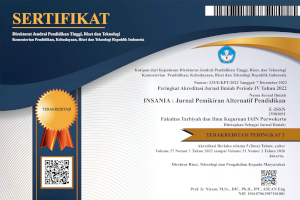IMPLEMENTASI PENDIDIKAN INKLUSI PADA ANAK USIA DINI (STUDI PADA PAUD INKLUSI DI KABUPATEN KEBUMEN)
DOI:
https://doi.org/10.24090/insania.v25i1.3291Kata Kunci:
pendidikan inklusi, anak usia diniAbstrak
Abstrak Penelitian ini bertujuan mendeskripsikan Implementasi Pendidikan Inklusi pada Anak di PAUD Inklusi Kabupaten Kebumen, Jawa Tengah sebagai upaya memberikan pelayanan kepada anak berkebutuhan khusus. Penelitian ini dilakukan di tiga lembaga PAUD Inklusi di kabupaten Kebumen untuk memperoleh data kesesuaian pelaksanaan pendidikan inklusi dengan pedoman pelaksanaan pendidikan inklusi dan pelayanan terhadap Anak Berkebutuhan Khusus. Penelitian ini menggunakan rancangan penelitian kualitatif. Pengumpulan data dilakukan melalui metode wawancara terhadap pendidik, tenaga kependidikan, serta wali murid. Metode observasi langsung dilakukan guna mengamati berbagai kegiatan bermain dan pembelajaran. Untuk data- data pendukung tentang implementasi pendidikan inklusi, peneliti menggunakan metode dokumentasi. Hasil penelitian menunjukkan pelaksanaan pendidikan inklusi pada lembaga PAUD inklusi di kabupaten Kebumen telah mengupayakan penerapan kurikulum kegiatan pembelajaran regular meskipun terdapat pelayanan secara terpisah untuk anak-anak yang berkebutuhan khusus dengan tenaga yang terbatas dan belum sesuai dengan jenis kebutuhan khusus anak. Keywords pendidikan inklusi, anak usia diniUnduhan
Referensi
Moleong,L.J. (2007). Metodologi Penelitian Kualitatif. Bandung: PT. Remaja Rosdakarya.
Pedoman Teknis Penyelenggaraan Pendidikan Inklusif. (2013).(online), (edukasi.kompasiana.com/…/sekolah-inklusi dan abk), diakses 3 Januari 2019).
Slavin, R.E. (2012). Psikologi Pendidikan. Jakarta: Indeks.
Suyadi. (2012). Psikologi Belajar Anak Usia Dini. Yogyakarta: Pedagogia.
Undang- undang Nomor 20 Tahun 2003, tentang Sistem Pendidikan Nasional. Jakarta: PT Aman Duta Jaya.
Yuliani, Nurani, Sujiono. (2011). Konsep Dasar Pendidikan Anak Usia Dini. Jakarta: Indeks.
Unduhan
Diterbitkan
Cara Mengutip
Terbitan
Bagian
Lisensi
Authors who publish with this journal agree to the following terms:
Authors retain copyright and grant the journal right of first publication with the work simultaneously licensed under a Creative CommonsAttribution-ShareAlike License that allows others to share the work with an acknowledgment of the work's authorship and initial publication in this journal.
Authors are able to enter into separate, additional contractual arrangements for the non-exclusive distribution of the journal's published version of the work (e.g., post it to an institutional repository or publish it in a book), with an acknowledgment of its initial publication in this journal.
Authors are permitted and encouraged to post their work online (e.g., in institutional repositories or on their website) prior to and during the submission process, as it can lead to productive exchanges, as well as earlier and greater citation of published work (See The Effect of Open Access).








